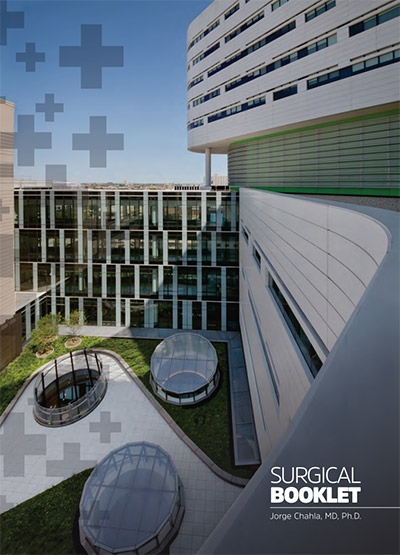Pre-Operative Instructions
Medications
Prior to surgery, one of Dr. Chahla’s physician assistants will be reaching out to you over the phone to discuss your post-operative medications. Post-operative medications may vary slightly due to a patient’s allergies, current non-operative medications, or the surgical procedure itself. However, in general, a blood thinner (typically Aspirin) will be prescribed to help mitigate the risk of blood clots following surgery. Additionally, a pain medication (typically Norco) will also be prescribed. Norco is a narcotic medication that we recommend taking as needed to help control your post-operative pain. Usually, our patients are beginning to discontinue use of the narcotic medication after 3-4 days following their surgery, depending on the type of procedure that was performed. Finally, an anti-nausea medication called Zofran can also be prescribed to help alleviate post-operative nausea if one experiences this side effect from the anesthesia.
Dr. Chahla’s physician assistant will take time during this phone call to answer any questions that you may have regarding the specific medications being prescribed for your upcoming surgery. They will also confirm your preferred pharmacy. Post-operative medications will be sent prior to surgery. Although you do not need to begin any of the medications before your surgery, we do recommend that you pick up the medications prior to surgery day in order to ease your stress on the day of your procedure. This also ensures that you have your medications for after surgery in the event that your pharmacy is closed when you are discharged from the surgery center.
Physical Therapy
Physical therapy is an essential part of your recovery after surgery. Without physical therapy, your range of motion, biomechanics, and strength may not be restored, which can lead to long term limitations. Therefore, it is required that you attend physical therapy following your procedure.
On the day of your surgery, you will go home with a post-operative folder from Dr. Chahla’s office. This folder will include a physical therapy order as well as a physical therapy protocol that is unique to the surgery that you underwent. Please bring these documents to your initial post-operative physical therapy visit so that your physical therapist can provide you with the care that is required specifically for your procedure.
For most of our procedures, we ask that patients begin physical therapy 1-2 days following surgery (scheduling for Monday if your surgery is on a Friday is okay). You will be informed by a member of Dr. Chahla’s team if your surgery does not require physical therapy to be scheduled 1-2 days after surgery. Because physical therapy clinics can fill up quickly, we ask that you contact your physical therapy office as soon as possible to schedule your initial post-operative appointment. If you are looking for a physical therapy facility, find a list of the Midwest Orthopaedics at Rush Physical Therapy locations here.
Please note, if you will be using crutches after your surgery, it may be beneficial to schedule a one-time pre-operative physical therapy session in addition to your post-operative sessions to learn how to properly use crutches in your home/on stairs if you have never used crutches before.
Preparing for Surgery
The time leading up to your surgery can be very stressful. Dr. Chahla and his team strive to help ease this process for you, and we are here to assist you in any way that we can. Here are a few important things leading up to your surgery to remember in order to ensure that you are prepared:
- Pre-operative Clearance – Pre-operative clearance is required for your health and safety. As our patient, your health is our top priority, and we want to be sure that it is safe to proceed with your surgery. Therefore, we require all pre-operative clearance documents discussed with you at the time that you signed up for surgery to be received by our office 7 days prior to surgery. Pre-operative clearance can be obtained through Rush or your personal primary care office. If you have any questions regarding this, please contact our office at 312.432.2531 or chahlaadmin@rushortho.com.
- Durable Medical Equipment (DME) – Depending on the type of surgery that you are undergoing, you may require a brace, sling, or crutches following your procedure. Additionally, you will have the option to purchase a cold therapy unit (ice machine). The ice machine is not required, although it is recommended in order to help manage post-operative pain and swelling. All of these items can be obtained through our DME office. Before surgery day, an email will be sent to you from our DME Team with further information regarding this. There is a DME office located at all of the Midwest Orthopaedic at Rush clinic sites should you wish to look at these items in person. No appointment is necessary. Additionally, you can always contact our DME office at 708.492.5664 with any questions.
- Schedule Physical Therapy
- Initial Post-operative Visit – If you do not have the date of your initial post-operative visit with Dr. Chahla’s team, please contact our office directly at 312.432.2531
- Consult Dr. Chahla’s Surgical Booklet for the list of any medications that need to be discontinued leading up to your surgery.
- Pick up Post-operative Medications
- Driving Restrictions – Following surgery, you will not be allowed to drive while taking narcotic medications or if using a sling, brace/cast, or crutches. Therefore, please begin coordinating with family and/or friends to assist you around your home and transport you to and from physical therapy as well as follow-up appointments with your surgical team. We recommend planning ahead for this to help ease your stress following surgery.
Download our Preoperative Booklet.
At a Glance
Dr. Jorge Chahla
- Triple fellowship-trained sports medicine surgeon
- Performs over 500 surgeries per year
- Assistant professor of orthopedic surgery at Rush University
- Learn more



